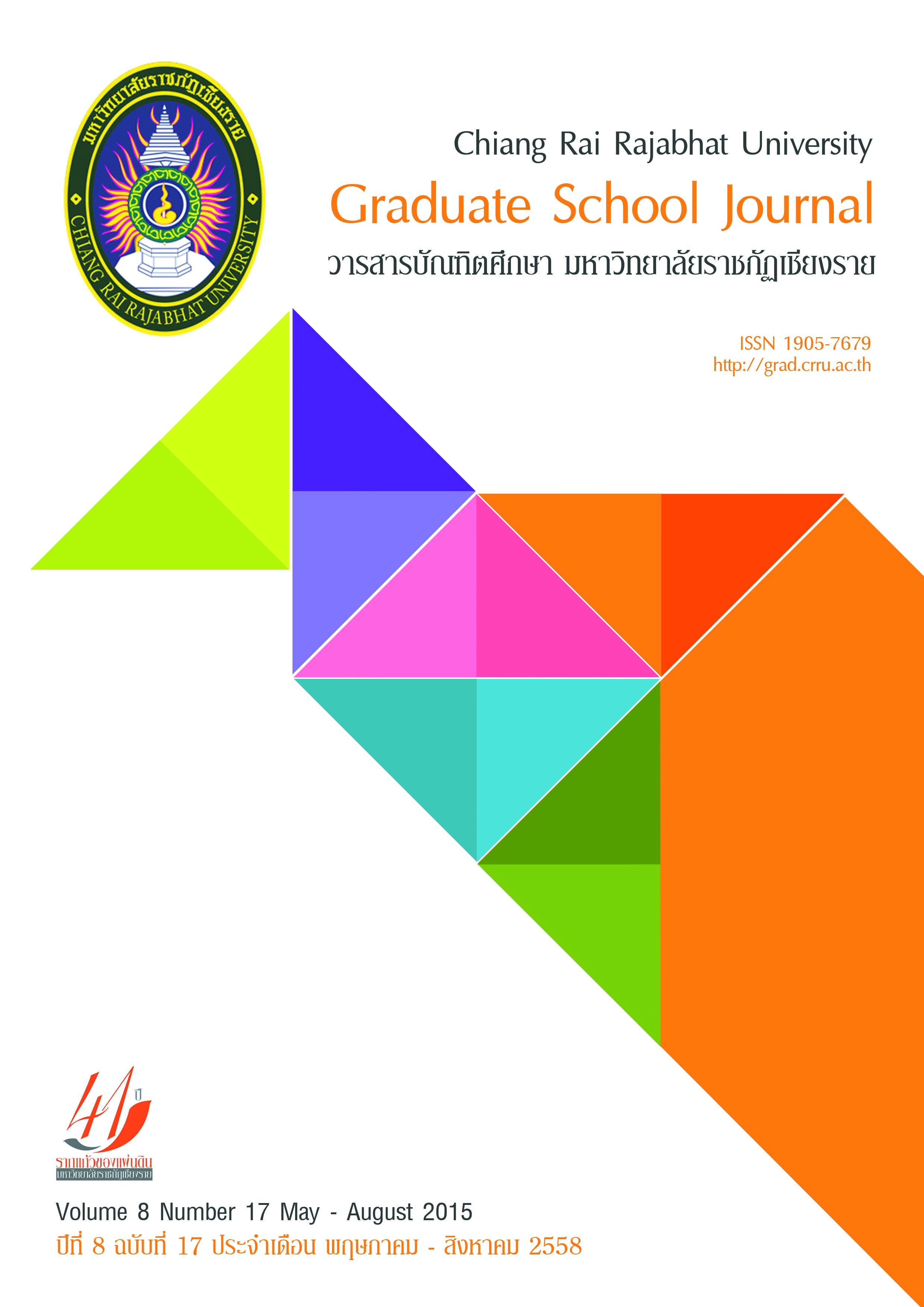ผลการจัดการเรียนรู้ สาระการเรียนรู้ ศาสนา ศีลธรรม จริยธรรม ตามวิธีสอนแบบอริยสัจสี่ สำหรับนักเรียนชั้นมัธยมศึกษาปีที่ 3
Main Article Content
Abstract
ผลการวิจัยพบว่า
1. แผนการจัดการเรียนรู้สาระการเรียนรู้ศาสนา ศีลธรรม จริยธรรม เรื่องหลักธรรมทางพระพุทธศาสนาชั้นมัธยมศึกษา ปีที่ 3 โดยวิธีสอนแบบอริยสัจสี่มีประสิทธิภาพ 85.45/88.64แสดงว่ามีประสิทธิภาพตามเกณฑ์ 80/80 ที่ตั้งไว้ และดัชนี ประสิทธิผลของแผนการจัดการเรียนรู้มีค่าเท่ากับ 0.6148 แสดงว่านักเรียนมีความรู้เพิ่มขึ้นร้อยละ 61.48
2. คะแนนผลสัมฤทธิ์ทางการเรียนตามวิธีการสอนแบบอริยสัจสี่ เรื่องหลักธรรมทางพระพุทธศาสนาสาระการเรียนรู้ ศาสนา ศีลธรรม จริยธรรม ชั้นมัธยมศึกษาปีที่ 3 พบว่า คะแนนเฉลี่ยก่อนเรียนเท่ากับ 21.20 คิดเป็นร้อยละ 53.00 และคะแนน เฉลี่ยหลังเรียนเท่ากับ 32.80 คิดเป็นร้อยละ 82.00 แสดงว่าคะแนนเฉลี่ยหลังการจัดการเรียนรู้สูงกว่าก่อนการจัดการเรียนรู้
3. ความพึงพอใจของนักเรียนที่มีต่อการจัดการเรียนรู้สาระการเรียนรู้ศาสนา ศีลธรรม จริยธรรมตามวิธีการสอนแบบ อริยสัจสี่ เรื่องหลักธรรมทางพระพุทธศาสนาชั้นมัธยมศึกษาปีที่ 3 อยู่ในระดับมาก
The Effects of Learning Provision for Religion, Morality and Ethics Subjects Taught by the Four Noble Truth Method for Mattayom Suksa III Students
The purposed of this research were to develop the efficiency and effectiveness of the learning plan for religion, morality and ethics subjects titled “the Dhamma of Buddhism” for Mattayom Suksa 3 with teaching by the four noble truth method, to study on learning achievements of Mattayom Suksa 3 students toward learning provisions for religion, morality and ethics subjects titled “the Dhamma of Buddhism” with teaching by the four noble truth method and to study the satisfaction of Mattayom Suksa 3 students toward learning provisions for religion, morality and ethics subjects titled “the Dhamma of Buddhism” with teaching by the four noble truth method of 30 Mattayom Suksa 3 students in Bandongnamdua school, Phetchabun Primary Education Service Area Office 2, semester 2, 2013. The research instruments were: the learning plan of religion, morality and ethics subjects titled “the Dhamma of Buddhism” with teaching by the four noble truth method. The learning achievement test and the satisfaction questionnaire of students toward learning provision for religion, morality and ethics subjects titled “the Dhamma of Buddhism” with teaching by the four noble truth method.
The results were :
1. The learning plan of religion, morality and ethics subjects titled “the Dhamma of Buddhism” for Mattayom Suksa 3 with teaching by the four noble truth method found that the effectiveness was 85.45 /88.64 having the efficiency of the standard criteria at 80/80. The effective index of the learning plan was 0.6148 and this indicated that the students have a knowledge increased of 61.48 percent.
2. The scores of learning achievements on the four noble truths teaching method titled “the Dhamma of Buddhism” in religion, morality and ethics subjects for Mattayom Suksa 3 have found that the average score of the pre-test was 21.20 with 53.00 percent and the average score of the post-test was 32.80 with 82.00 percent meaning that the average scores of the post-test were higher than the pre-test.
3. The satisfaction of students towards learning in religion, morality and ethics subjects with teaching by the four noble truth method titled “the Dhamma of Buddhism” for Mattayom Suksa 3 was at a high level.
Article Details
บทความที่ได้รับการตีพิมพ์เป็นลิขสิทธิ์ของวารสารมหาวิทยาลัยราชภัฎเชียงราย
ข้อความที่ปรากฏในบทความแต่ละเรื่องในวารสารวิชาการเล่มนี้เป็นความคิดเห็นส่วนตัวของผู้เขียนแต่ละท่านไม่เกี่ยวข้องกับมหาวิทยาลัยราชภัฎเชียงราย และคณาจารย์ท่านอื่นๆในมหาวิทยาลัยฯ แต่อย่างใด ความรับผิดชอบองค์ประกอบทั้งหมดของบทความแต่ละเรื่องเป็นของผู้เขียนแต่ละท่าน หากมีความผิดพลาดใดๆ ผู้เขียนแต่ละท่านจะรับผิดชอบบทความของตนเองแต่ผู้เดียว

